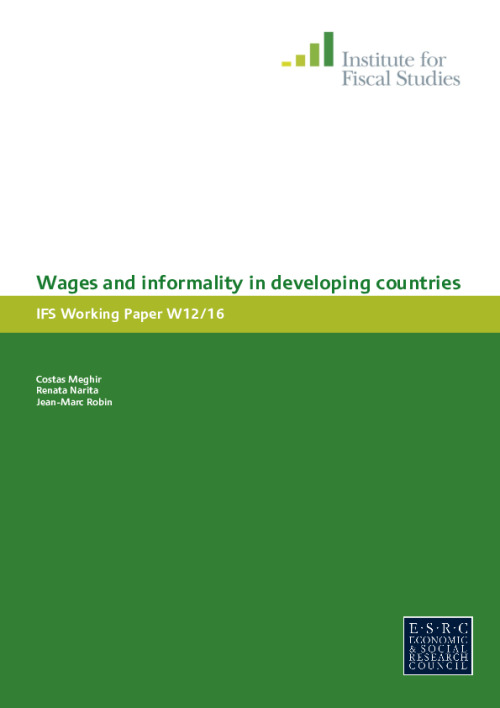Downloads

wp1216.pdf
PDF | 406.73 KB
It is often argued that informal labor markets in developing countries promote growth by reducing the impact of regulation. On the other hand informality may reduce the amount of social protection offered to workers. We extend the wage-posting framework of Burdett and Mortensen (1998) to allow heterogeneous firms to decide whether to locate in the formal or the informal sector, as well as set wages. Workers engage in both off the job and on the job search. We estimate the model using Brazilian micro data and evaluate the labor market and welfare effects of policies towards informality.
Authors

Research Fellow Yale University
Costas is a Research Fellow of the IFS and a Professor of Economics at Yale University and a Visiting Professor at University College London.

Research Fellow Sciences Po and University College London
Jean-Marc is a Research Fellow of the IFS and a Professor of Economics at Sciences Po, Paris, and University College London.

Renata Narita
Working Paper details
- DOI
- 10.1920/wp.ifs.2012.1216
- Publisher
- IFS
Suggested citation
C, Meghir and R, Narita and J, Robin. (2012). Wages and informality in developing countries. London: IFS. Available at: https://ifs.org.uk/publications/wages-and-informality-developing-countries-1 (accessed: 30 June 2024).
More from IFS
Understand this issue

Election Special: Your questions answered
27 June 2024

What is the two-child limit in benefits?
27 June 2024

Election Special: The big issues politicians haven't spoken about
25 June 2024
Policy analysis

How do the last five years measure up on levelling up?
19 June 2024

How would the parties’ tax and spending plans affect Scotland and Wales?
28 June 2024

What are the parties’ plans for benefits and taxes?
24 June 2024
Academic research

The impact of labour demand shocks when occupational labour supplies are heterogeneous
28 June 2024

Targeting men, women or both to reduce child marriage
28 May 2024

Keeping the peace whilst getting your way: Information, persuasion and intimate partner violence
17 May 2024